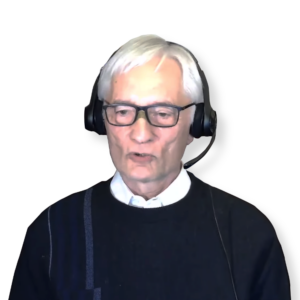
Ep 166 | Peter Strack
Peter Strack – 2000-Watt Society: The Realities of Living a Lower Energy Lifestyle
Summary
Caught between increasing energy prices and rising carbon emissions, the idea of reducing our energy consumption is a practical and forward-looking necessity. Yet, with communities in the United States averaging ten thousand watts per year – with other Western countries close behind – our excessive energy consumption is built into both our physical and cultural infrastructure. How much energy do we truly need to lead fulfilling lives, and what changes would be necessary in our neighborhoods and cities to achieve that?
In today’s discussion, Nate is joined by Peter Strack, a French researcher and author, to explore the concept of 2000-Watt Societies—innovative models that aim to balance reduced energy consumption with the well-being of the people who live there. Peter explains the historical context of energy consumption and origins of lower-energy communities, as well as the necessary changes in infrastructure, social dynamics, and personal habits to reduce energy consumption while sustaining a lifestyle that is fulfilling and caring for residents.
How can building relationships based on trust and reciprocity within our communities enhance resilience and help reduce energy consumption? What models already exist for communal infrastructure and sharing the labor needed for maintenance and care work? Finally, how could the 2000-Watt Society offer a more comfortable, connected way of living for more people – perhaps even more than high-energy Western lifestyles – while staying within our environmental and resource constraints?
About Peter Strack
Peter Strack worked for 40 years in industrial research and engineering at MAHR France. After retiring, he became aware of the environmental crises facing our planet and the energy constraints limiting popular solutions. He went on to research, study, and advocate for 2000-watt neighborhoods, including authoring a book titled Practically Sustainable: 2000 watt eco-neighborhoods – a model for a sustainable lifestyle towards a post-oil democratic society (which is currently only available in French). The 2000-watt neighborhoods offer a different, arguably more desirable, way of living that drastically reduces the power demands of the people living there compared to their average counterparts in industrial societies. Learn more about Peter’s research on 2000-watt societies on his website.
In French, we have a motto that says that a simple drawing is often better than a long explanation. Jean-Marc Jancovici Carbone 4 President
That’s very understandable because with left atmosphere thinking, one of the problems is that you see everything as a series of problems that must have solutions. Iain McGilchrist Neuroscientist and Philosopher
We can’t have hundreds and hundreds of real relationships that are healthy because that requires time and effort and full attention and awareness of being in real relationship and conversation with the other human. Nate Hagens Director of ISEOF
This is the crux of the whole problem. Individual parts of nature are more valuable than the biocomplexity of nature. Thomas Crowther Founder Restor
Show Notes & Links to Learn More
Download transcript00:00 – Pratiquement Durable
01:15 – Primary energy consumption per capita around the world
02:12 – Jacques Ellul
03:57 – 2000-watt society
04:19 – Basic needs and much more with one kilowatt per capita
05:47 – ETH Zürich
09:13 – Energy consumption per capita in Switzerland + more info
09:35 – Energy embedded in imports
09:51 – Swiss energy consumption is ~7000 watts per capita
10:25 – French energy consumption is ~6000 watts per capita
10:51 – US is around 10000+ watts per capita consumption
11:13 – Global average energy consumption is around ~3000 watts per capita
11:34 – Jason Hickel
13:40 – Limits to Growth
15:06 – Renewable Electricity Futures Study | Energy Analysis | NREL
16:45 – French report on what the energy sector should look like by 2050
17:44 – Swiss 2000-watt sites, Green City
18:25 – Gray Energy
19:56 – Matthias Probst, ETH Zürich
20:37 – Familistère de Guise: A French social palace
27:33 – More Than Housing
32:09 – Strack’s resources on how to make highly optimized buildings
35:15 – French subsidies for insulating housing
35:22 – Average cost savings for insulating housing
36:28 – Percentage of the average person’s carbon footprint comprised of travel
48:20 – Websites coordinating communal living projects
51:33 – European gas prices multiplied by 6 in 2022 during Russian gas disruptions, effects on standards of living and price of everything
58:04 – How shared infrastructure affects community relationships
59:58 – Cooperatives
1:05:45 – The psychological effects of marketing and advertisements
1:08:11 – Hillary Clinton, It Takes A Village, potential African origins
1:08:45 – New York City after a few days of stopped garbage collection
1:13:39 – Mimetic Desires, René Girard







